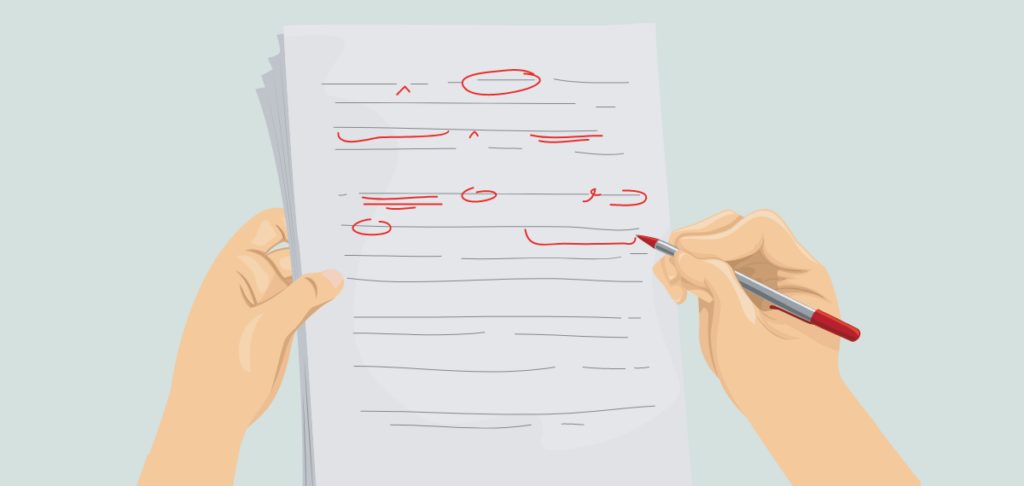Proofreading is an essential step in the writing process, ensuring clear, concise, and well-organized messages. It involves meticulously reviewing a text to correct errors in grammar, punctuation, spelling, consistency, and formatting.
Unlike editing, which focuses on broader aspects like structure and content, proofreading zeroes in on fine details to polish the final draft. Neglecting this crucial step can lead to misunderstandings and compromise the author’s credibility.
Delve deeper to grasp the significance of proofreading and how it can elevate your writing prowess.

Why Proofreading Is Important
Proofreading holds immense importance as it meticulously corrects grammar, spelling, punctuation, and convention errors, ensuring language accuracy and consistency. It offers a detailed examination of the text, focusing on surface-level mistakes often overlooked in editing. Acting as the final review, proofreading ensures the document’s completeness and professionalism.
In my experience participating in hiring panels, I’ve observed that cover letters and resumes lacking proofreading are swiftly disregarded. Simple errors like poor wording, sentence structure issues, and capitalization problems become glaringly evident, leaving a negative impression on the applicant’s presentation skills.
Devoting time to proofread your materials yields multiple benefits, including error elimination, enhanced professionalism, improved credibility, and potentially increased earnings. The following reasons underscore why investing time in proofreading your work is worthwhile.
Eliminates Errors
Proofreading plays a crucial role in identifying and rectifying spelling mistakes, grammatical errors, punctuation errors, and typos. Eliminating these errors makes your writing more accurate and easier to understand.
Clarity
Proofreading allows you to review the flow and organization of your writing. This process ensures that your ideas are presented clearly, logically, and coherently, enhancing your work’s overall readability. Your goal is to allow your reader to understand your message without confusion or the need to seek clarification.
Readability
Proofreading allows you to refine the language, tone, and style of your writing. It enables you to choose the most appropriate words, phrases, and expressions to convey your message effectively and engage your readers.
Accuracy
Proofreading serves as a final quality check, enabling you to spot any weaknesses that may have been missed during editing. It allows you to correct awkward sentence structures, unclear statements, or factual inaccuracies. Addressing these issues prevents confusion among your readers or ensures that you appear as knowledgeable and competent as you truly are.
Professionalism

Proofreading ensures that your content is error-free, regardless of whether you’re a student, a professional, or an aspiring writer. This commitment to presenting polished work contributes to a positive and professional image, demonstrating your dedication to quality, your pride in your writing, and your respect for your audience.
Protects Reputation
Proofreading helps eliminate spelling mistakes, grammatical errors, and typos that can undermine the credibility and professionalism of the content. By presenting error-free content, you demonstrate attention to detail and a commitment to clear communication, which enhances your reputation as a competent and reliable communicator.
Consistency
Proofreading ensures consistency in the use of formatting, such as headings, font styles, and indentation. It also helps maintain adherence to style guides, citation formats, and referencing systems, enhancing the overall coherence and professionalism of the document.
Persuasiveness
Proofreading plays a crucial role in making your writing more persuasive. It allows you to review the evidence and examples you’ve used to support your arguments. By ensuring their relevance, accuracy, and strength, you can make your arguments more convincing.
Well-supported arguments can sway your audience to accept your viewpoint, making your writing more effective and influential.
Facilitates Learning
Proofreading requires careful reading and understanding of the written content. By reviewing and correcting errors, you reinforce your understanding of the subject matter. This active engagement with the text enhances your comprehension and retention of the information being presented and, in turn, provides you the skills to better facilitate new ideas and research in your own writing.
Moreover, well-proofread content conveys the intended message clearly, contributing further to the learning process.
Boosts Grades

By incorporating proofreading into your writing process, you can enhance the overall quality of your work and increase your likelihood of achieving higher grades. Your attention to proofreading details allows you to check once again the accuracy of your material and the clarity of your message. Teachers appreciate not having to re-read materials during the grading process.
Credibility
Well-proofread content demonstrates attention to detail and reflects professionalism. It helps establish your credibility as a writer or proofreader, whether it’s an academic paper, a professional report, or any other form of written communication.
People who can easily discern your message and are not distracted by convention use, spelling, or formatting issues are more likely to search your work out in the future.
Improves Search Engine Optimization (SEO)
Proofreading allows you to review the use of keywords throughout your content. By checking the placement, density, and relevance of keywords, you can ensure that they are strategically incorporated in a natural and effective manner. This helps search engines understand the topic and relevance of your content, potentially improving its visibility in search results.
Saves Money
Proofreading helps catch errors that could lead to costly consequences. For example, in legal or financial documents, even a minor typographical error or misplaced decimal point can have significant financial implications. By identifying and correcting such errors, proofreading can prevent financial losses or legal complications.
This also extends to products that may end up in print to help avoid misprints or reprints, which can quickly add up in cost.
Prevents Misunderstandings
Proofreading minimizes the risk of miscommunication or misinterpretation of your ideas. By catching errors, you can ensure that your intended meaning is accurately conveyed, preventing confusion or misunderstanding.
Readers who have to re-read materials to try and understand your message are more likely to misunderstand your attempts. Depending on the importance of the work, this could potentially cause issues in your job or even financially.
Enhances Reader Experience

By presenting error-free content, you provide readers with a positive reading experience. They can focus on your message without being distracted by spelling or grammatical errors. This positive experience fosters trust, engagement, and a favorable perception of your work.
Strengthens Arguments
Proofreading strengthens the overall quality of your arguments by ensuring clarity, coherence, and effectiveness in your writing. It allows you to evaluate the logical flow of your ideas and the coherence of your arguments.
You can make your arguments more robust and compelling by identifying and correcting any weaknesses, such as unclear statements or unsupported claims. Strong arguments are essential for persuading your audience and convincing them of your viewpoint, making proofreading a vital step in the writing process.
Supports Brand Image
Proofreading ensures consistency in language usage, tone, and style, which is essential for maintaining a consistent brand image. Whether proofreading for a company, organization, or personal brand, ensuring error-free content reinforces a consistent and professional brand identity.
Aids in Effective Communication
Proofreading ensures that ideas are expressed coherently. By reviewing sentence structure, word choice, and overall flow, you can eliminate confusing or ambiguous statements and enhance the overall readability of your work. This clarity enhances your reputation as a clear and effective communicator.
Builds Trust
Proofreading helps identify and correct factual errors, inaccuracies, or misleading information. By ensuring the accuracy of your content, you protect your reputation as a reliable and knowledgeable source of information. Being meticulous about the facts and presenting accurate information helps build trust and credibility.
Facilitates Translation
Proofreading facilitates translation by ensuring accuracy, verifying language and grammar, maintaining consistency in terminology and style, and fostering feedback. By thoroughly reviewing and refining the translated content, proofreading contributes to producing high-quality translations that accurately convey the intended meaning to the target audience.
Reflects Care and Effort
Proofreading allows you to make necessary revisions and improve the overall quality of your work. The practice reflects care and effort by showcasing attention to detail, dedication to accuracy, commitment to clarity, pride in presentation, and ensuring accuracy. By investing the time and effort to review and refine your work meticulously, you demonstrate your commitment to producing high-quality, error-free written content.
Master the art of precision writing!
Embark on our proofreading and editing course.
Conclusion
Proofreading plays a vital role in ensuring written communication’s clarity, accuracy, and professionalism. By meticulously reviewing and correcting grammar, spelling, punctuation, and consistency errors, proofreading enhances the overall quality of documents, instills credibility, and fosters trust with the audience.
It is essential for writers to allocate adequate time and resources to the proofreading stage or consider seeking professional proofreading services for critical documents. By integrating thorough proofreading practices into their writing routines, writers can significantly enhance the effectiveness and impact of their work.
Remember, the investment in proofreading not only improves the quality of your writing but also reflects your commitment to excellence and attention to detail. Embrace the proofreading process with enthusiasm and diligence, and reap the rewards of clear, polished, and error-free communication in your writing journey.
